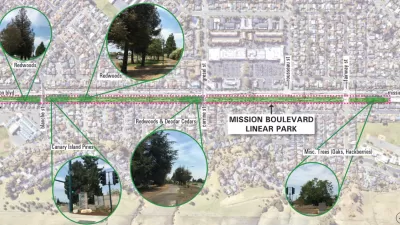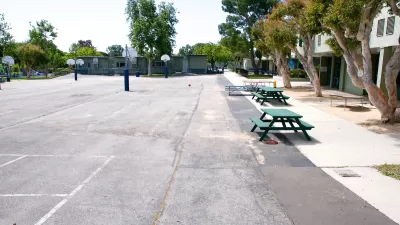With guidance from the Trust for Public Land, third graders at Overbrook Elementary are leading the redesign of their asphalt schoolyard into a vibrant green space, learning valuable skills and creating lasting community impact in the process.

At Overbrook Elementary School in West Philadelphia, third graders are taking the lead in transforming their asphalt-covered schoolyard into a vibrant green space with support from the Trust for Public Land (TPL). As part of TPL’s participatory design program, students work in teams, study maps of the schoolyard, and brainstorm ideas — ranging from basketball courts to shaded seating areas. As reported by Celia Bernhardt, the initiative is part of a larger effort by TPL to address the lack of green space in low-income neighborhoods, revamping schoolyards into climate-resilient community spaces that serve both students and the wider public.
Through weekly design sessions, students at Overbrook and other participating schools learn about design, collect community input, and contribute to the development of new outdoor spaces. Once plans are finalized, TPL helps fund, design, and construct the projects, which often include features like trees, play equipment, gardens, and even outdoor performance stages. These green schoolyards are seen as critical for public health, promoting physical activity, improving behavior, reducing suspensions, and enhancing academic performance. At Overbrook, where students lack access to amenities like a gym or auditorium, the redesigned yard will provide a safer and more engaging space to learn and play.
The process not only gives students a physical space to enjoy but also instills confidence, communication skills, and a sense of ownership. Educators and experts agree that involving children in decisions fosters agency and self-advocacy, with potential to positively influence other aspects of their education. As they navigate real-world challenges like budgets and community needs, students gain valuable life lessons. For the young designers at Overbrook, the chance to create something lasting for their school and neighborhood is both empowering and transformative—showing that their voices truly matter.
FULL STORY: Overbrook Elementary third graders are working to turn their asphalt schoolyard into a community green space

Alabama: Trump Terminates Settlements for Black Communities Harmed By Raw Sewage
Trump deemed the landmark civil rights agreement “illegal DEI and environmental justice policy.”

Planetizen Federal Action Tracker
A weekly monitor of how Trump’s orders and actions are impacting planners and planning in America.

The 120 Year Old Tiny Home Villages That Sheltered San Francisco’s Earthquake Refugees
More than a century ago, San Francisco mobilized to house thousands of residents displaced by the 1906 earthquake. Could their strategy offer a model for the present?

LA’s Tree Emergency Goes Beyond Vandalism
After a vandal destroyed dozens of downtown LA trees, Mayor Karen Bass vowed to replace them. Days later, she slashed the city’s tree budget.

Sacramento Leads Nation With Bus-Mounted Bike Lane Enforcement Cameras
The city is the first to use its bus-mounted traffic enforcement system to cite drivers who park or drive in bike lanes.

Seattle Voters Approve Social Housing Referendum
Voters approved a corporate tax to fund the city’s housing authority despite an opposition campaign funded by Amazon and Microsoft.
Urban Design for Planners 1: Software Tools
This six-course series explores essential urban design concepts using open source software and equips planners with the tools they need to participate fully in the urban design process.
Planning for Universal Design
Learn the tools for implementing Universal Design in planning regulations.
Ada County Highway District
Clanton & Associates, Inc.
Jessamine County Fiscal Court
Institute for Housing and Urban Development Studies (IHS)
City of Grandview
Harvard GSD Executive Education
Toledo-Lucas County Plan Commissions
Salt Lake City
NYU Wagner Graduate School of Public Service





























